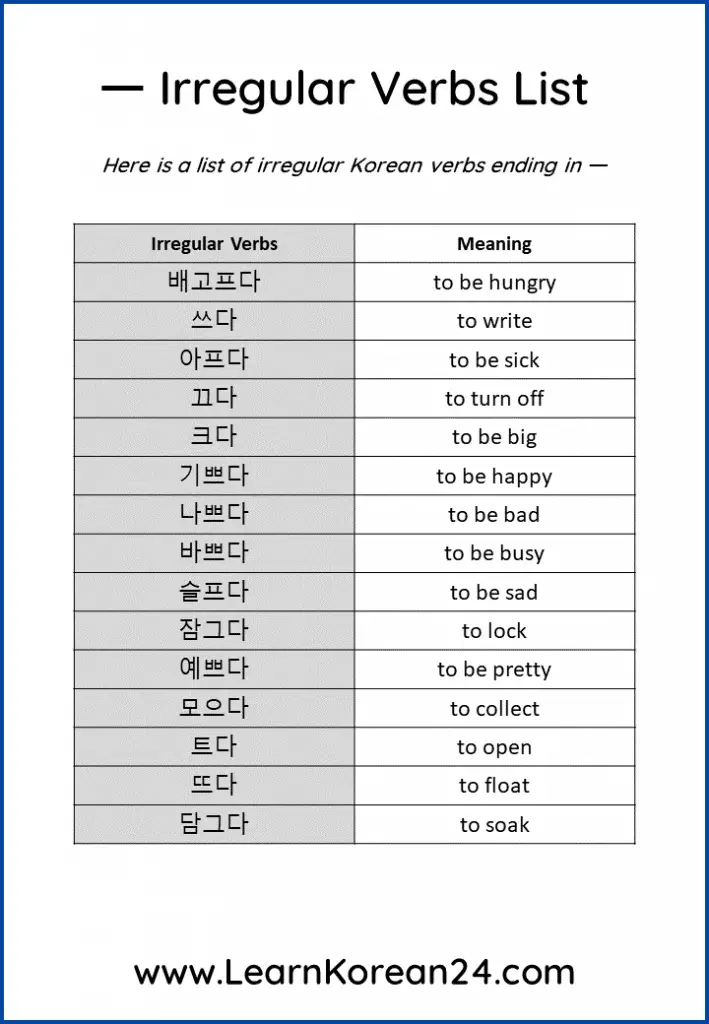Irregular Korean Verbs With ‘으’ (으 불규칙)
Of the seven types of irregular verbs in Korean, 으 irregular verbs (으 불규칙) are perhaps the easiest to master. This is because there are no exceptions to the conjugation rules.
On this page, you can learn about Korean irregular verbs and adjectives which end in the vowel 으. Below you will find a list of irregular verbs with 으, and you will learn how to conjugate irregular verbs which end in 으.
To help you learn these irregular verbs, you can also download and print a PDF list of these verbs and a conjugation chart below.
으 Irregular (으 불규칙)
In your Korean studies, you may have come across some ㅡ irregular verbs without even knowing it. For instance, 고프다 (to be hungry) is irregular and so it is conjugated differently compared to regular verbs. For example, when conjugated in the present tense, 고프다 becomes 고파요, not 고프어요.
Here is a list of irregular Korean verbs that end in 으 (으 불규칙):
- 고프다 = to be hungry
- 쓰다 = to write
- 아프다 = to be sick
- 끄다 = to turn off
- 크다 = to be big
- 기쁘다 = to be happy
- 나쁘다 = to be bad
- 바쁘다 = to be busy
- 슬프다 = to be sad
- 잠그다 = to lock
- 예쁘다 = to be pretty
- 모으다 = to collect
- 트다 = to open
- 뜨다 = to float
- 담그다 = to soak
How To Conjugate ‘으’ Irregular Verbs (으 불규칙)
Irregular verbs ending in ㅡ are relatively easy to conjugate compared to other irregular verbs. Here are the key things to remember when conjugating irregular verbs that end in ㅡ:
1. 으 irregular verbs and adjectives only behave irregularly if the ending which is attached starts with a 아 or 어.
For example, 아요/어요 (present tense), 았어요 / 었어요 (past tense), 아서/어서 (so), etc. With all other endings that do not start with 아 / 어, ㅡ irregular verbs do not behave irregularly. Instead, they behave just like regular verbs and are therefore conjugated just the same as regular verbs.
2. The second thing to know about 으 irregular verbs is ㅡ is always dropped when an ending starting with 아 or 어 is attached.
So, when conjugating an irregular 으 verb, the first thing you must do is drop the ㅡ from the end of the verb/adjective stem (e.g. 고프다 → 고ㅍ)
3. The third thing to know about 으 irregular verbs is that the vowel that precedes ㅡ determines whether 아 or 어 is used in the ending.
For example, when changing a verb into the present tense, you must choose 아요 or 어요, and when changing a verb into the past tense, you must choose 았어요 or 었어요. The one you should use when conjugating irregular ㅡ verbs and adjectives is determined by the vowel which comes before ㅡ.
If the vowel before ㅡ is ㅏ or ㅗ, use the ending starting with 아
For example, the vowel that comes before ㅡ in the adjective 아프다 (to be sick) is ㅏ. So, the ending starting with 아 should be used.
아프다 = to be sick
아파요 = sick (present tense)
아팠어요 = was sick (past tense)
If the vowel before ㅡ is NOTㅏ or ㅗ, or there is no vowel use the ending starting with 어
For example, the vowel that comes before ㅡ in the adjective 예쁘다 (to be pretty) is not ㅏ or ㅗ. So, the ending starting with 어 should be used.
예쁘다 = to be pretty
예뻐요 = pretty (present tense)
예뻤어요 = was pretty (past tense)
4. The last thing to know about 으 irregular verbs is that verbs and adjectives ending in 르 are a different kind of irregular verb, and so do not follow these rules.
All verbs and adjectives which end in ㅡ are irregular. However, verbs and adjectives which end in 르 are different and follow different conjugation rules. Check out our lesson on 르 irregular verbs to learn more.
Irregular 으 Examples
Here are some examples of irregular verbs and adjectives that end in ㅡ conjugated with some common endings from our teacher Arah:
Irregular 으 Example Sentences
Here are some useful example sentences with 으 Irregular Verbs.
- 방이 정말 커요. (크다) = The room is really big.
- 이번 주말에 바빠요? (바쁘다) = Are you busy this weekend?
- 책을 읽을 때 핸드폰을 꺼요. (끄다) = When I read a book, I turn off my cellphone.
- 담배는 건강에 나빠요 (나쁘다) = Cigarettes are bad for your health.
- 아침을 안 먹어서 배고파요 (배고프다) = I didn’t have breakfast so I am hungry.
More Korean Irregular Verb Lessons
There are seven types of irregular verbs in Korean. For more lessons on Korean Irregular verbs, click on the links below.
ㅂ Irregular
ㅡ Irregular
르 Irregular
ㄷ Irregular
ㄹ Irregular
ㅅ Irregular
ㅎ Irregular


